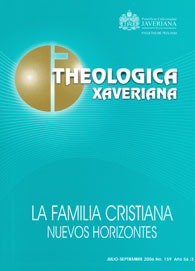Resumo
La realidad matrimonial es compleja y a su vez debe asumir otros factores externos como son el contexto, la familia de origen, las crisis, etc. De ahí que vivir en pareja exija grandes dosis de madurez, paciencia y amor. Sin embargo, la reflexión que quiere plantear este artículo es precisamente cómo esta unidad antropológica encuentra en la dimensión sacramental un camino de salvación, tanto para sus miembros como para la familia. El sacramento encuentra sus raíces en lo profundamente humano y desde allí se puede comprender su horizonte trascendente. Lo que se celebra es la vida, una vida que adquiere sentido profundo cuando se cree en Jesucristo, y se hace posible que la relación de dos se convierta en signo del amor trinitario en medio de una comunidad.
Esta revista científica se encuentra registrada bajo la licencia Creative Commons Reconocimiento 4.0 Internacional. Por lo tanto, esta obra se puede reproducir, distribuir y comunicar públicamente en formato digital, siempre que se reconozca el nombre de los autores y a la Pontificia Universidad Javeriana. Se permite citar, adaptar, transformar, autoarchivar, republicar y crear a partir del material, para cualquier finalidad (incluso comercial), siempre que se reconozca adecuadamente la autoría, se proporcione un enlace a la obra original y se indique si se han realizado cambios. La Pontificia Universidad Javeriana no retiene los derechos sobre las obras publicadas y los contenidos son responsabilidad exclusiva de los autores, quienes conservan sus derechos morales, intelectuales, de privacidad y publicidad.
El aval sobre la intervención de la obra (revisión, corrección de estilo, traducción, diagramación) y su posterior divulgación se otorga mediante una licencia de uso y no a través de una cesión de derechos, lo que representa que la revista y la Pontificia Universidad Javeriana se eximen de cualquier responsabilidad que se pueda derivar de una mala práctica ética por parte de los autores. En consecuencia de la protección brindada por la licencia de uso, la revista no se encuentra en la obligación de publicar retractaciones o modificar la información ya publicada, a no ser que la errata surja del proceso de gestión editorial. La publicación de contenidos en esta revista no representa regalías para los contribuyentes.


